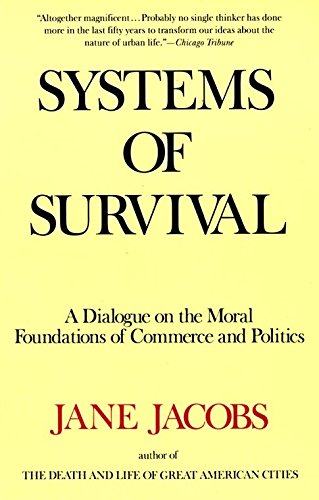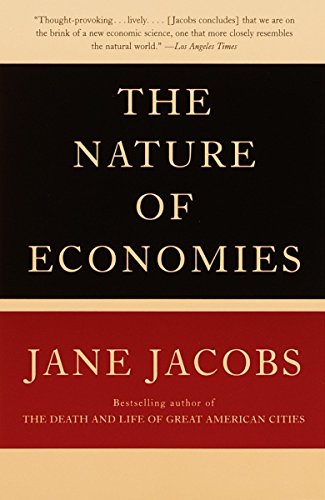If a scientific theory provides a true description of reality, it will manifest itself in several ways. For one, different approaches to the truth will all converge upon the same underlying reality; for another, a theory congruent with reality will reveal its truth in more areas than the area of empirical observation that originally gave rise to it. Thus, Newton’s development of the calculus coincided with Leibniz’s, both working towards the same fundamentally correct method of mathematical analysis of the existing world (and matching Archimedes’ method?); Newton’s understanding of gravity was reflected in the falling of objects on earth, and in Kepler’s elliptical orbits of the planets. If Austrian economics also reflects an underlying reality, it must likewise be approachable by different methods and be true outside pure economics, as Mises intended praxeology to be applicable throughout the social sciences.
Jane Jacobs, whose 94th birthday would have been celebrated May 4th, was an original thinker and urban theorist. Where Mises’ theory begins with the axiomatic "Man acts," (just try and disprove that without acting!) and elaborates a whole coherent approach to economics from it, Jacobs seems to say "Cities live," and builds theory upon those observations. Her corpus of seven books shows few if any "Austrian" sources in her bibliographies, and yet the conclusions she draws often seem merely a different way of stating the same descriptions as Mises.
 The Death and Life of ...
Best Price: $3.37
Buy New $10.00
(as of 10:43 UTC - Details)
The Death and Life of ...
Best Price: $3.37
Buy New $10.00
(as of 10:43 UTC - Details)
Jacobs started her first book, The Death and Life of Great American Cities, by looking at her own neighborhood (Greenwich Village, where Mises worked at NYU at the same time that Jacobs was writing) and describing the interplay on the streets that has become known by her description of the "ballet of Hudson Street." The urban environment stimulated the safe mixing of people of different ages and backgrounds, with commerce in the form of the small business owner providing a key ingredient to overall order; one salient observation is that the diverse sources of diners for both lunch (local workers) and dinner (nearby homeowners) allow a wider range of restaurants to thrive, with both groups benefitting the other even without direct interaction. The result of this interaction is a spontaneous order in the Hayekian sense, something Butler Shaffer would recognize, and Jacobs comes close to using that exact term; it was certainly something organic, although government could play a part in it with police reinforcing the existing order, and it was unplanned.
 The Economy of Cities
Best Price: $7.65
Buy New $8.43
(as of 01:20 UTC - Details)
The Economy of Cities
Best Price: $7.65
Buy New $8.43
(as of 01:20 UTC - Details)
Her disdain for urban planners arose from a number of sources. For one, she observed the disastrous results of what she called the "sacking of cities" at their hands. Another source was theoretical. In the Rockefeller Foundation report for 1958, she discovered the approach to scientific problems of Dr. Warren Weaver, that there were three different types: problems of simplicity wherein "physical science learned how to analyze two-variable problems," problems of disorganized complexity that involved too many variables to track but could nonetheless be modeled statistically, and problems of organized complexity where the many variables did not act like independent molecules but acted upon and reacted with each other. Urban planners seemed, at best, to treat cities as problems of disorganized complexity, but as agglomerations of rationally acting people, they were problems of organized complexity, and the analytical tools necessary to address those problems did not exist.
The same situation obtains in economics. Keynes’ economic formulation seems at base to be an effort to reduce economics to a problem of simplicity: C+I+G+X—M=GDP. Econometrics improves on this model to treat the field as statistical relationships "believed to hold between the various economic quantities pertaining a particular economic phenomena under study"; in other words, as a problem of disorganized complexity. And yet the fundamental problem is that "man acts," and confounds the actions of urban planners and government bureaucrats: cities and economics must necessarily deal with problems of organized complexity. Praxeology thus appears to be the appropriate tool for studying economics, or cities, treating both as problems of organized complexity.
 Human Action: A Treati...
Check Amazon for Pricing.
Human Action: A Treati...
Check Amazon for Pricing.
What Jacobs and Mises have in common is the centrality of Human Action in functioning economies and cities. This is in great contrast to conventional economists who take a "cargo cult" view of economic functioning, presuming the existence of an economy without understanding how it comes about; these are the masters of studying how "widgets" are produced.
For Mises, the entrepreneur is central to economic functioning. As Rockwell writes: "Ludwig von Mises didn’t like references to the u2018miracle’ of the marketplace or the u2018magic’ of production or other terms that suggest that economic systems depend on some force that is beyond human comprehension… u2018What distinguishes the successful entrepreneur and promoter from other people,’ writes Mises, u2018is precisely the fact that he does not let himself be guided by what was and is, but arranges his affairs on the ground of his opinion about the future.’" It is this anticipation of future demand, and the guts to strike out in pursuit of it, that grows the economy.
 Dark Age Ahead
Best Price: $4.48
Buy New $7.66
(as of 12:55 UTC - Details)
Dark Age Ahead
Best Price: $4.48
Buy New $7.66
(as of 12:55 UTC - Details)
Jacobs wrote The Economy of Cities (one of the top 100 books of the 20th century) to make this very point, her targets being Adam Smith and David Ricardo with their focus on division of labor as the source of economic well-being. Division of labor only produces the same items more efficiently, but it does not create new items, which is where economic expansion happens. Rather, economic growth is created in import-replacing cities where workers at firms "spin out" and pursue new opportunities. Jacobs’ description of this process taking place in post-war Los Angeles illustrates WHY the post-war era was not a time of return to depression, as functioning urban economies were able to expand by producing more diversified products and creating new ones.
The conditions supporting economic flourishing were thus a topic of investigation for both Mises and Jacobs. As Hoppe wrote: "Mises had recognized… (that) democracy does not work in multi-ethnic societies. It does not create peace but promotes conflict and has potentially genocidal tendencies." Democracy leads to ethnic conflict: "In newly founded Czechoslovakia, for instance, the Germans were systematically mistreated (until they were finally expelled by the millions and butchered by the tens of thousands after World War II) by the majority Czechs." Mises warned of the dangers of requiring ethnic groups to learn in public schools in different languages.
 Systems of Survival: A...
Best Price: $1.99
Buy New $11.03
(as of 10:41 UTC - Details)
Systems of Survival: A...
Best Price: $1.99
Buy New $11.03
(as of 10:41 UTC - Details)
Jacobs saw the same dynamic applying in her adopted land, Canada. Montreal, economic locus of the nation, had been edged aside by Toronto and was fading into insignificance, and an increasingly anglicized Canada was pushing French Quebec into the background. Jacobs saw the need for peaceful separation to the benefit of both parts of the society; her A Question of Separatism used the peaceable separation of Norway and Sweden as a guide for the secession of Quebec. Failure to do so would lead to continued ethnic strife and significant economic underperformance; like Mises, she saw the problem as one of excess centralization and lack of subsidiarity, an issue she was to write about further in her last book, Dark Age Ahead.
Putting too large a territory under one rule means that it is easier to garner "wealth" by political means, rather than economic ones, especially when a central bank was involved. As Mises wrote: "The excellence of the gold standard is to be seen in the fact that it renders the determination of the monetary unit’s purchasing power independent of the policies of governments and political parties. Furthermore, it prevents rulers from eluding the financial and budgetary prerogatives of the representative assemblies. Parliamentary control of finances works only if the government is not in a position to provide for unauthorized expenditures by increasing the circulating amount of fiat money."
Jacobs wrote Systems of Survival to ponder this very case. She originally wanted to focus the book on "traders and raiders," considering the political class to be parasitic on the productive trading class, but eventually decided that every role in society was either one of trading or guarding: her book "explores the morals and values that underpin viable working life. Like the other animals, we find and pick up what we can use, and appropriate territories. But unlike the other animals, we also trade and produce for trade. Because we possess these two radically different ways of dealing with our needs, we also have two radically different systems of morals and values — both systems valid and necessary." Corruption of either role leads to problems in society, and each role in a properly functioning society must have methods to police the other.
She decided that a system of values guided each area:
Guardian Syndrome’s Moral Precepts Commerce Syndrome’s Moral Precepts
- Shun trading
- Exert prowess
- Be obedient and disciplined
- Adhere to tradition
- Respect hierarchy
- Be loyal
- Take vengeance
- Deceive for the sake of the task
- Make rich use of leisure
- Be ostentatious
- Dispense largesse
- Be exclusive
- Show fortitude
- Be fatalistic
- Treasure honor
- Shun force
- Compete
- Be efficient
- Be open to inventiveness and novelty
- Use initiative and enterprise
- Come to voluntary agreements
- Respect contracts
- Dissent for the sake of the task
- Be industrious
- Be thrifty
- Invest for productive purposes
- Collaborate easily with strangers and aliens
- Promote comfort and convenience
- Be optimistic
- Be honest
 The Nature of Economies
Best Price: $6.07
Buy New $8.40
(as of 01:05 UTC - Details)
The Nature of Economies
Best Price: $6.07
Buy New $8.40
(as of 01:05 UTC - Details)
Libertarian theory, following Mises, likewise recognized a need for a guardian role, albeit segregated from the state. Perhaps the best proposal was Rothbard’s use of insurance companies to supply the needs of guardianship in society.
 The Black Swan: Second...
Best Price: $3.11
Buy New $10.37
(as of 01:40 UTC - Details)
The Black Swan: Second...
Best Price: $3.11
Buy New $10.37
(as of 01:40 UTC - Details)
It is, after all, society that supports the wellbeing of all. Mises saw economic law as an outgrowth of natural law: he "proved that it was quite possible to insist that economic laws did exist and did place constraints on what was possible in the economic sphere without also endorsing any nonsense about mathematical precision or purely u2018economic’ motives exhausting man’s reasons for acting." This natural law governed the functioning of society as a whole, and economic systems that struggled against economic law were fated to be less competitive.
Jacobs adopts a similar viewpoint in The Nature of Economies. She uses the natural web as a metaphor for a functioning economy; she insists that an economy is an expression in human action of evolutionary pressures. She contrasts the sterile environments of deserts and monocultures (like all those fields growing corn for high fructose corn syrup) with the thriving environment of the rainforest where the same input solar energy is used many times by the incredible diversity of species. A functioning urban economy, like late-19th-century Chicago or present-day Hong Kong, will focus on many tasks and be more resilient to (economic) climate change than the Ricardian "comparatively advantaged" one. Indeed, this point is echoed in Mauboussin’s More Than You Know; fitness landscapes provide that the optimal strategy for a company or an economy is fundamentally unknowable, so the most economically robust course is to have many avenues of pursuit. (A point also brought up by Nicholas Nassim Taleb in the paperback version of The Black Swan.)
It is observations like Jacobs’ that have gained her increasing respect as an economic analyst, just as Keynes has faded in comparison to Mises. Paul Romer has begun to examine how economic growth actually happens, and he is finding that charter cities are essential to creating functioning economies, as Hong Kong, under British law, created the economic colossus that is modern China’s economy. That the recognition of these two giants of economic thought has come after their deaths is saddening, but points again to the fundamental truth that Mises and Jacobs both pursued.





